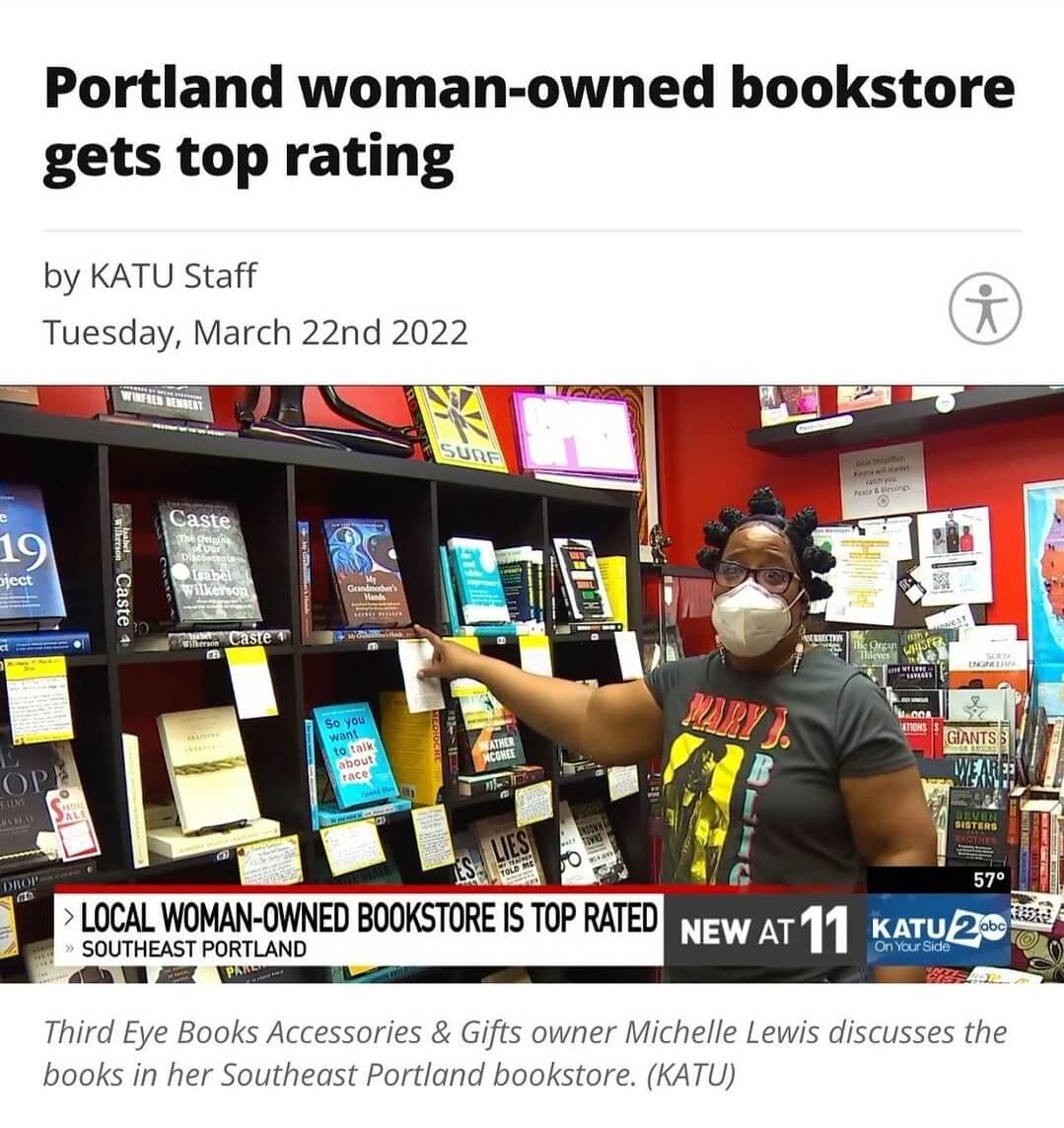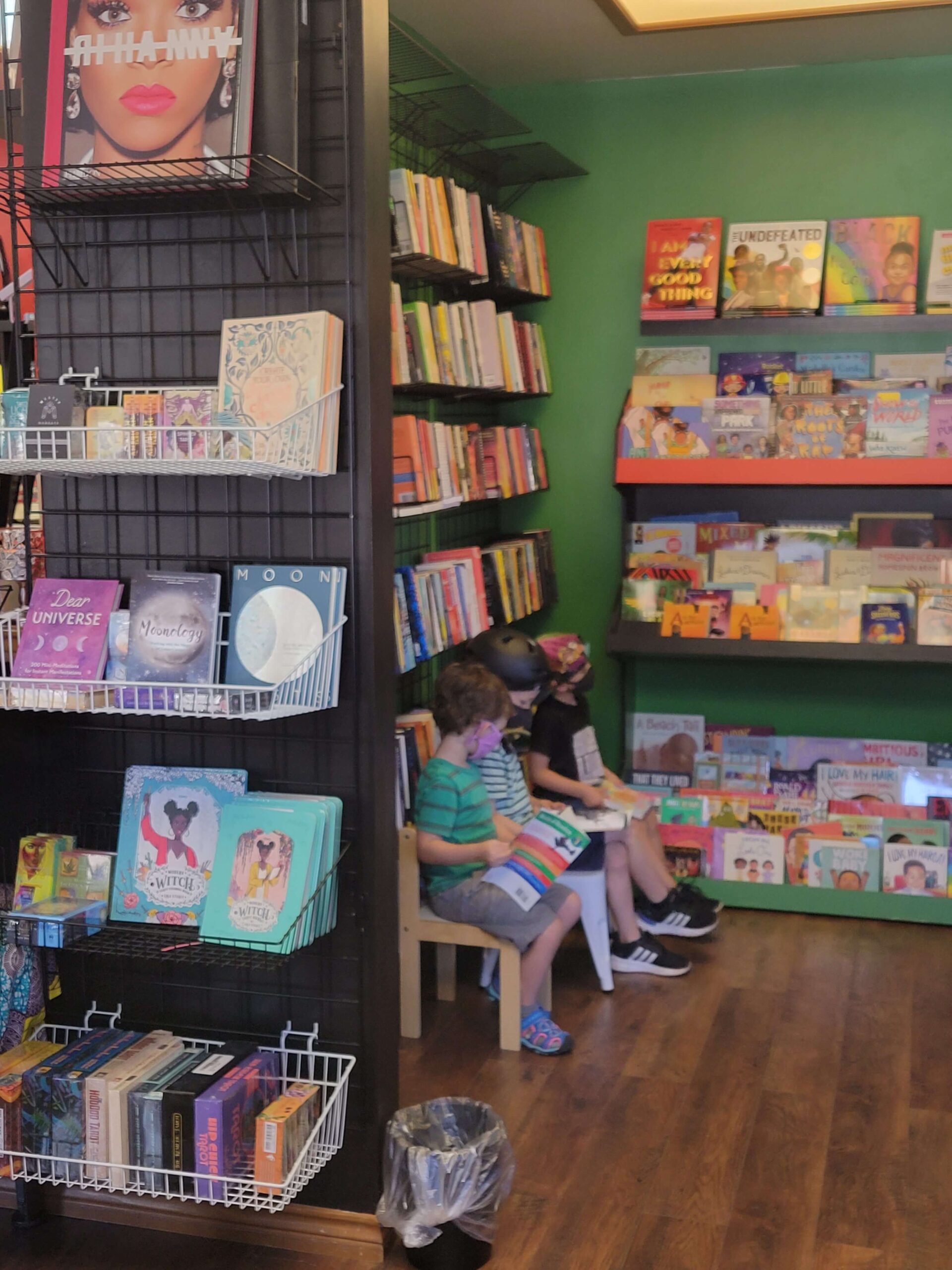MORA, Minn. – Who says a book can only have one ending? Authors Deb Mercier and Ryan Jacobson, of Lake 7 Creative, are flipping the Choose Your Path concept on its head, challenging readers to “survive” new interactive middle grade novels that will entice even the most reluctant of readers. With the debut of the Detective: You series (Oct 11. 2022), Lake 7 imaginatively introduces the mystery genre to new generations of young readers who are charged with solving their own mysteries. It’s up to readers to identify suspects and gather clues, making choices that affect what happens next.
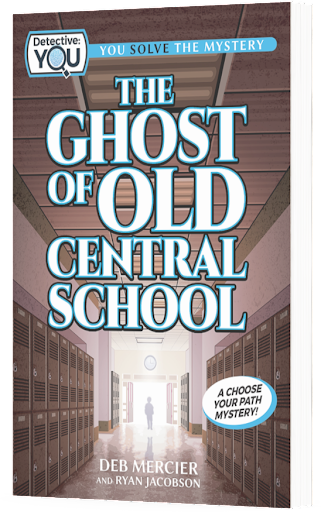
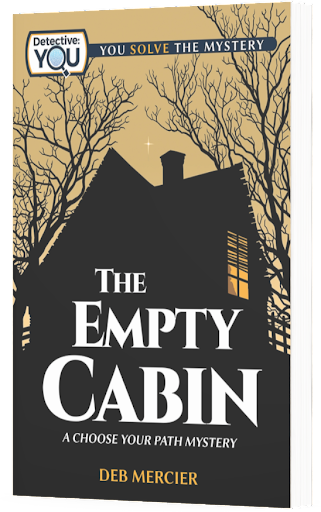 “The Empty Cabin”
“The Empty Cabin”
978-1940647739 | Paperback, $9.95 | Hardcover, $22.95 | Ebook, $8.99
The cabin resort your parents own is the perfect place to spend a summer. There’s swimming, fishing, birding — and a steady stream of visitors who, from week to week, pass in and out of your life. Except for Loretta, a regular guest of Cabin #4. So when you find her cabin empty one morning, you know something’s wrong. Build your case and use deductive reasoning to determine what the crime was, how it happened — and whodunit.
“The Ghost of Old Central School”
978-1940647753 | Paperback, $9.95 | Hardcover, $22.95 | Ebook, $8.99
Old Central School is closing for good because it’s reportedly haunted! The incidents have gotten so freaky that parents refuse to send their kids to school. Yet Irene Gorter, a student there, doesn’t believe it’s true — and she’s hiring you to prove it. Choose your supplies, and let the investigation begin. But be careful; one wrong choice could lead to your doom!
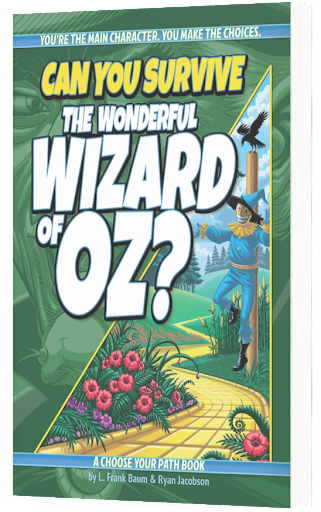 “Can You Survive the Wonderful Wizard of Oz?”
“Can You Survive the Wonderful Wizard of Oz?”
978-1940647715 | Paperback, $9.95 | Hardcover, $22.95 | Ebook, $8.99
You are Dorothy, the accidental adventurer. You’ve been swept away from your home in Kansas by a deadly tornado. Now, you find yourself in the Land of Oz, a fantastical world of witches, monsters and talking animals. You must use your knowledge and courage — and plenty of help from your strange collection of friends — to survive. Do you have what it takes to traverse the road of yellow brick?
Relaunching Oct. 11, 2022, from Lake 7 Creative
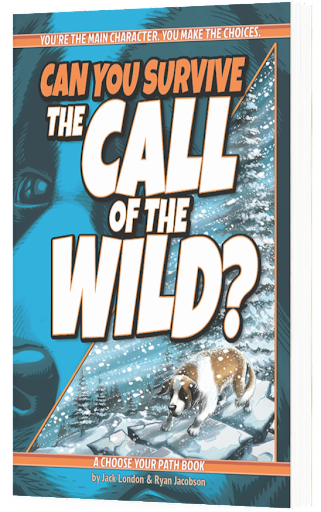 “Can You Survive the Call of the Wild?”
“Can You Survive the Call of the Wild?”
Paperback, 978-1940647654, $9.95 | Hardcover, 978-1940647791, $22.95
You are Buck, the famous sled dog. You have been stolen from your comfortable life in California and forced into servitude. Now, you find yourself in Alaska, a dangerous world of greedy men and savage dogs. Every moment, your life is at risk. You must use your strength, your cunning wit and your animal instincts to survive such perils as bear attacks, wolf encounters, starvation and the frigid temperatures of Canada’s Yukon. Do you have what it takes to make it out alive?
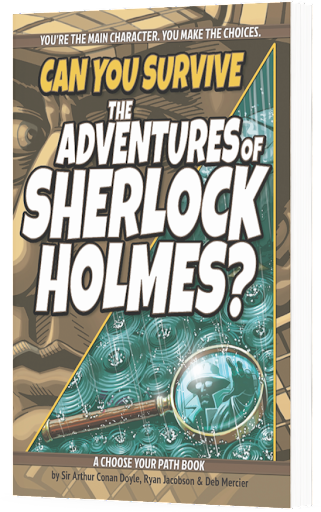 “Can You Survive the Adventures of Sherlock Holmes?”
“Can You Survive the Adventures of Sherlock Holmes?”
Paperback, 978-1940647678, $9.95 | Hardcover, 978-1940647807, $22.95
You are Sherlock Holmes, consulting detective. You have been approached by three desperate clients, each of whom presents a compelling case for you to solve. Now, you must choose which mysteries are worth investigating and which might be too dangerous. Every moment, your life is at risk. Use your cunning to search for evidence, follow the clues and survive such perils as vile criminals, clever traps and even wild animals. Do you have what it takes to solve three of Sherlock Holmes’ most puzzling cases?
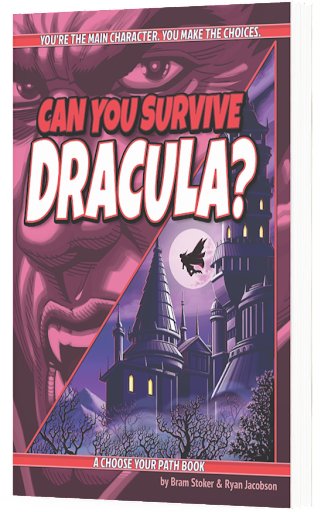 “Can You Survive Dracula?”
“Can You Survive Dracula?”
Paperback, 978-1940647692, $9.95 | Hardcover, 978-1940647814, $22.95
You are Jonathan Harker, an ordinary man thrust into an extraordinary situation. You have been tricked and imprisoned. You’ve come face to face with a monster and left behind to suffer a terrible fate. Now, you must put an end to Count Dracula’s evil reign. Assemble your team of vampire hunters, and prepare for battle. Every moment, your life is at risk. Use your courage and wisdom to survive such perils as wolf encounters, mysterious strangers and deadly fires. Do you have what it takes to defeat the deadly villain?
About Ryan Jacobson
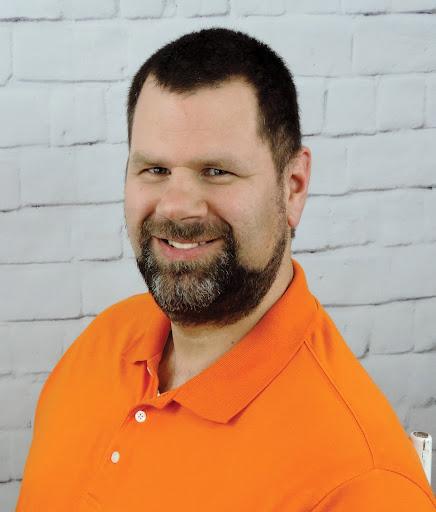 Ryan Jacobson is an award-winning author. He has written more than 60 books, with topics ranging from silly to scary. Ryan prides himself on writing high-interest books for children and adults alike, so he can talk about picture books in kindergarten, ghost stories in high school and other fun stuff in between. Some of his most popular works include the “Constellations Activity Book,” “Eagle in the Sky” and “Can You Survive the Call of the Wild?” Ryan is also the co-owner and president of Lake 7 Creative, LLC. His company creates activity books and sports books, and it specializes in developing interactive Choose Your Path books for young readers. When he isn’t writing, Ryan likes to build LEGO sets, play board games and try new restaurants. He lives in eastern Minnesota with his wife and two sons.
Ryan Jacobson is an award-winning author. He has written more than 60 books, with topics ranging from silly to scary. Ryan prides himself on writing high-interest books for children and adults alike, so he can talk about picture books in kindergarten, ghost stories in high school and other fun stuff in between. Some of his most popular works include the “Constellations Activity Book,” “Eagle in the Sky” and “Can You Survive the Call of the Wild?” Ryan is also the co-owner and president of Lake 7 Creative, LLC. His company creates activity books and sports books, and it specializes in developing interactive Choose Your Path books for young readers. When he isn’t writing, Ryan likes to build LEGO sets, play board games and try new restaurants. He lives in eastern Minnesota with his wife and two sons.

Follow Ryan Jacobson on social media:
Facebook: @AuthorRyanJacobson and @Lake7Creative Instagram: @lake7creative
In an interview, Ryan Jacobson can discuss:
- Why Lake 7 Creative specializes in Choose Your Path books and how young readers can benefit from interactive storytelling
- The launch of the Detective: You series and expanding the Choose Your Path format into the mystery genre
- Choosing which classic tales to feature in the Can You Survive? series and turning scenes from children’s favorite books into Choose Your Path moments
- How to turn classic books with more mature or graphic subject matter into ones suitable for middle grade audiences
- Being a reluctant reader when he was a child and how that inspired him to create literature to entice young readers
- How you can find success as an author, writing and publishing your own books
- The relaunch of previous titles in Lake 7’s Can You Survive? series
- The founding of Lake 7 Creative and plans for the press’s future
An interview with Ryan Jacobson
You’ve said that you were a reluctant reader as a child. How did your experience with literature at a young age inspire you to write these unique books?
Oh, I didn’t like books at all. I read comic books and Sports Illustrated, but that didn’t actually count as reading back then. So when I finally discovered interactive fiction in about fifth grade, I was like, “Yes, I’m a reader now!” Years later, when I started writing books, I wanted to create that feeling in other young readers, too, which is why I always try to create books that I would’ve devoured as a child.
What made you want to start your press and how did you get started?
This wasn’t exactly something I sought to do. Way back in 2005, I wrote a chapter book called “Santa Claus: Super Spy,” mostly as a writing exercise. But after my wife and I decided to adopt a child (and saw how much money we’d need to raise!), I self-published the book on a wing and a prayer as an adoption fundraiser. It did so well that I kept publishing books, and we’re still at it today.
What are some of the challenges you’ve found running your own press? Some of the pleasant surprises?
The biggest challenge has always been finding the time. I started and grew Lake 7 as a side project, kind of a glorified hobby. The business part of it has always been a challenge for me too — especially the accounting. But I’ve gotten to meet a lot of really talented people. That’s something that always surprises me: how very talented people are.
Why is interactive storytelling important? Is it more beneficial for readers of a certain age?
This is a big question, and my brain is going 100 different directions with it. Let’s see … the format appeals to kids who may or may not otherwise be interested in books; it introduces choices and consequences; there’s a problem-solving element to it; it’s reading and it’s fun, like playing a game. With that said, I think the books are most beneficial for readers who haven’t quite found their “in” to the joys of reading yet, regardless of their age.
What is coming down the line for you and Lake 7?
We’ve had recent success with some activity books and sports books, and that’s allowed us an opportunity to grow and to refocus our efforts on the Choose Your Path format. We have some big plans for taking the format into new and different directions. Our ultimate goal is to become the “go-to” publisher for Choose Your Path books.
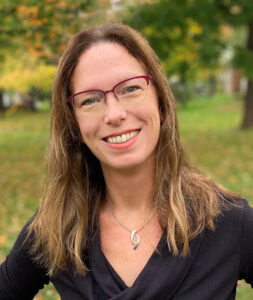 About Deb Mercier
About Deb Mercier
Deb Mercier lives in greater Minnesota with her husband, dogs and outdoor critter friends. She is an award-winning journalist, author of 11 books for young readers, a former newspaper editor and a technical writer.
When Deb’s not dreaming up new stories, you can find her wandering the trails on bike and on foot, saving turtles from roadways and playing flute in the Central Lakes Symphony Orchestra.
An interview with Deb Mercier
How did you get started as a writer?
I’ve always been surrounded by stories. Every week growing up, my mom took my brother and me to the library; it seemed natural to start writing my own adventures. My first publication was actually when I was a senior in high school. I wrote a poem after my mom passed away, and my English teacher submitted it to a national competition — I don’t even remember her doing it — and it won first place.
Where do you get your ideas for your books?
Like I tell my students at young author conferences, inspiration is everywhere! I may hear a snippet of conversation or see an old building that makes me wonder who used to live there.
Or maybe the way a squirrel studies the birdfeeder and chatters back at the dogs will lead to a scene … you just never know, so it’s best to pay attention.
What’s alluring about the Choose Your Path format?
As far as reading, the Choose Your Path format is a blast! Sure, it’s reading, but it’s also playing a game — one that doesn’t always turn out well if you make the wrong choice. Being in the driver’s seat as the main character of an adventure gives you control that you don’t normally have while reading, and that’s a ton of fun! As far as writing, the Choose Your Path format is a huge challenge, and I love a good challenge! It takes an incredible attention to detail and an ability to imagine different scenarios branching from a single scene (or maybe an object you forgot to pack). It’s not an easy format to tackle, but seeing kids (and adults) having so much fun navigating through the books makes every word worth it!
How did you begin working with Ryan and Lake 7 Creative?
I met Ryan forever ago at a young author conference held in Thief River Falls, Minnesota. He contacted me about possibly helping him finish a book he’d started: “Wrestling with a Werewolf.” Knowing nothing about wrestling or werewolves, I naturally took on the project. We’ve been working together since then.
What projects are you working on now?
Next up is another Detective: You title … to be determined. We’re pretty sure it’s going to be set at the same resort as “The Empty Cabin,” starring Sam (a.k.a. You). Stay tuned!

A former award-winning journalist with national exposure, Marissa now oversees the day-to-day operation of the Books Forward author branding and book marketing firm, along with our indie publishing support sister company Books Fluent.
Born and bred in Louisiana, currently living in New Orleans, she has lived and developed a strong base for our company and authors in Chicago and Nashville. Her journalism work has appeared in USA Today, National Geographic and other major publications. She is now interviewed by media on best practices for book marketing.
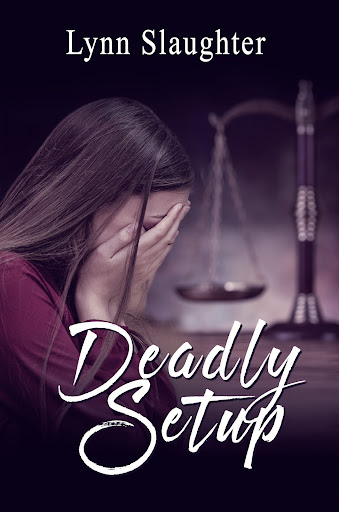 Award-winning author returns with dark, coming-of-age YA thriller
Award-winning author returns with dark, coming-of-age YA thriller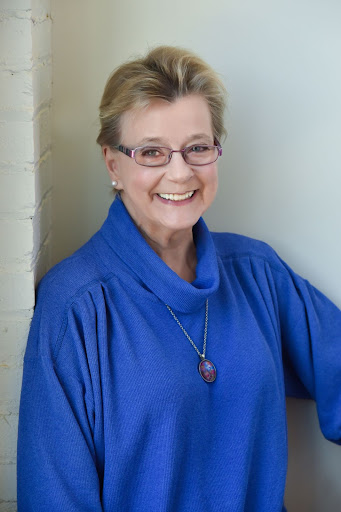 LYNN SLAUGHTER: Lynn Slaughter is addicted to chocolate, the arts, and her husband’s cooking. Like Sam, her family tree is peppered with musicians, and she’s a huge fan of the American Songbook. Music has always made her want to move, and she ended up becoming a professional dancer and dance educator. When injury meant it was time to find a new dream, she earned her MFA in Writing Popular Fiction from Seton Hill University. Her previous young adult novels include: Leisha’s Song, also published by Fire and Ice, which received a bronze medal from the Moonbeam Children’s Book Awards and was nominated for an Agatha for best MG/YA mystery novel; It Should Have Been You, a Silver Falchion finalist; and While I Danced, an Epic finalist. The ridiculously proud mother of two sons and grandmother of five, she lives in Louisville, Kentucky where she is at work on her next novel and serves as president of Derby Rotten Scoundrels, her local Sisters in Crime chapter. She loves hearing from readers and hopes you’ll visit her website,
LYNN SLAUGHTER: Lynn Slaughter is addicted to chocolate, the arts, and her husband’s cooking. Like Sam, her family tree is peppered with musicians, and she’s a huge fan of the American Songbook. Music has always made her want to move, and she ended up becoming a professional dancer and dance educator. When injury meant it was time to find a new dream, she earned her MFA in Writing Popular Fiction from Seton Hill University. Her previous young adult novels include: Leisha’s Song, also published by Fire and Ice, which received a bronze medal from the Moonbeam Children’s Book Awards and was nominated for an Agatha for best MG/YA mystery novel; It Should Have Been You, a Silver Falchion finalist; and While I Danced, an Epic finalist. The ridiculously proud mother of two sons and grandmother of five, she lives in Louisville, Kentucky where she is at work on her next novel and serves as president of Derby Rotten Scoundrels, her local Sisters in Crime chapter. She loves hearing from readers and hopes you’ll visit her website, 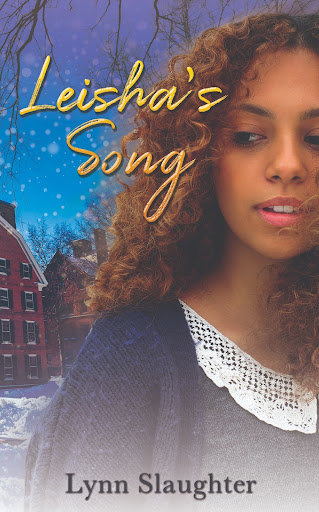 Nominated for 2021 Agatha Award for Best Children’s/YA Mystery Novel, Moonbeam Children’s Award Bronze Medalist, and Imadjinn Finalist for Best YA Novel
Nominated for 2021 Agatha Award for Best Children’s/YA Mystery Novel, Moonbeam Children’s Award Bronze Medalist, and Imadjinn Finalist for Best YA Novel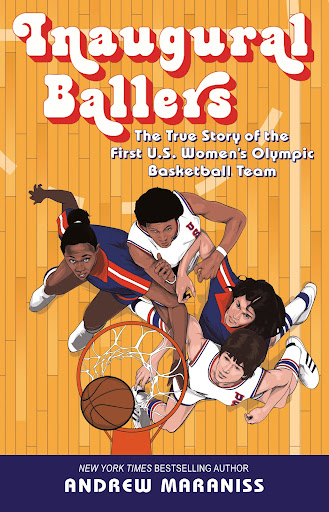 On 50th Anniversary of Title IX, Andrew Maraniss tells the true story of the first U.S. women’s Olympic basketball team
On 50th Anniversary of Title IX, Andrew Maraniss tells the true story of the first U.S. women’s Olympic basketball team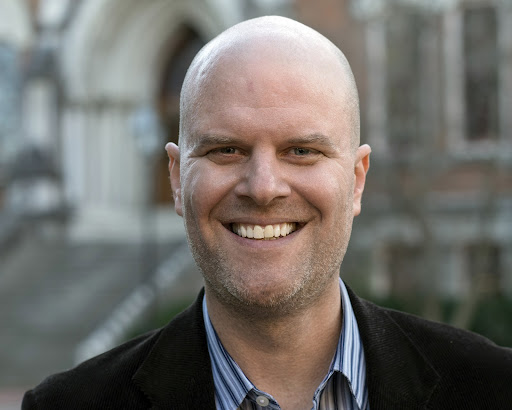 New York Times bestselling author Andrew Maraniss writes sports and history-related nonfiction, telling stories with a larger social message. His first book, “Strong Inside,” received the Lillian Smith Book Award for civil rights and the RFK Book Awards’ Special Recognition Prize for social justice, becoming the first sports-related book ever to win either award. His young readers adaptation of “Strong Inside” was named one of the Top Biographies for Youth by the American Library Association and was named a Notable Social Studies Book by the Children’s Book Council. His acclaimed second book for teens, “Games of Deception,” was a Sydney Taylor Book Award Middle Grade Honor Recipient and a Junior Library Guild selection. His third book, “Singled Out: The True Story of Glenn Burke,” was named to the 2022 Rainbow Book List and was named one of the “Top 100 Baseball Books Ever Written” by Esquire. Andrew lives in Nashville and is special projects director at the Vanderbilt University Athletic Department. Find out more about him at
New York Times bestselling author Andrew Maraniss writes sports and history-related nonfiction, telling stories with a larger social message. His first book, “Strong Inside,” received the Lillian Smith Book Award for civil rights and the RFK Book Awards’ Special Recognition Prize for social justice, becoming the first sports-related book ever to win either award. His young readers adaptation of “Strong Inside” was named one of the Top Biographies for Youth by the American Library Association and was named a Notable Social Studies Book by the Children’s Book Council. His acclaimed second book for teens, “Games of Deception,” was a Sydney Taylor Book Award Middle Grade Honor Recipient and a Junior Library Guild selection. His third book, “Singled Out: The True Story of Glenn Burke,” was named to the 2022 Rainbow Book List and was named one of the “Top 100 Baseball Books Ever Written” by Esquire. Andrew lives in Nashville and is special projects director at the Vanderbilt University Athletic Department. Find out more about him at 
 What’s your favorite area of your bookstore?
What’s your favorite area of your bookstore? Fenton, MI – Like death and taxes, some things are inevitable — including breakups. Psychologist Dr. Jodie Eckleberry-Hunt is helping readers get over heartbreak and move on with their lives in her new book, “Getting to Good Riddance: A No-Bullsh*t Breakup Survival Guide,” (Turner Publishing, July 26, 2022).
Fenton, MI – Like death and taxes, some things are inevitable — including breakups. Psychologist Dr. Jodie Eckleberry-Hunt is helping readers get over heartbreak and move on with their lives in her new book, “Getting to Good Riddance: A No-Bullsh*t Breakup Survival Guide,” (Turner Publishing, July 26, 2022).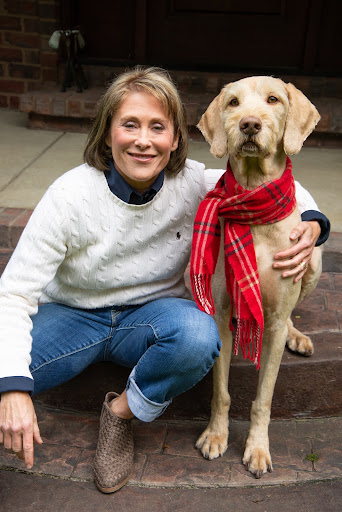 About the Author
About the Author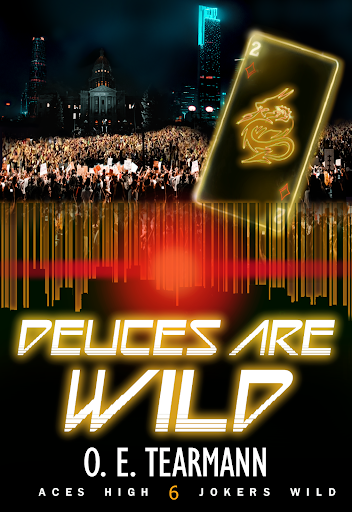 Base 1407 returns to help win back America’s freedom in uplifting continuation of the Aces HIgh, Jokers Wild series
Base 1407 returns to help win back America’s freedom in uplifting continuation of the Aces HIgh, Jokers Wild series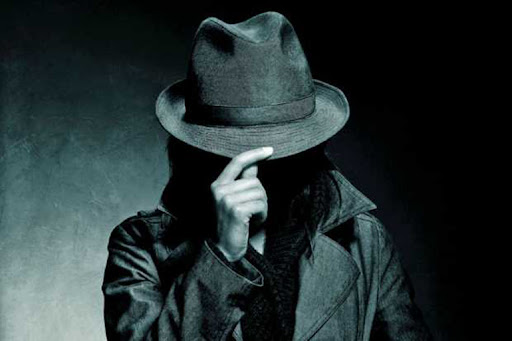 O.E. Tearmann (they/them) is the author of the Aces High, Jokers Wild series. Their books include strong themes of diversity and found family, providing a surprisingly hopeful take on a dystopian future. Bringing their own experiences as a marginalized author together with flawed but genuine characters, Tearmann’s work has been described as “Firefly for the dystopian genre.” Publisher’s Weekly called The Hands We’re Given “a lovely paean to the healing power of respectful personal connections among comrades, friends, and lovers.”
O.E. Tearmann (they/them) is the author of the Aces High, Jokers Wild series. Their books include strong themes of diversity and found family, providing a surprisingly hopeful take on a dystopian future. Bringing their own experiences as a marginalized author together with flawed but genuine characters, Tearmann’s work has been described as “Firefly for the dystopian genre.” Publisher’s Weekly called The Hands We’re Given “a lovely paean to the healing power of respectful personal connections among comrades, friends, and lovers.”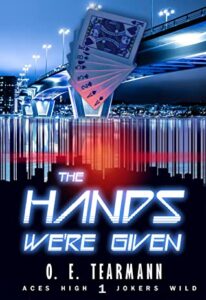 Aidan Headly never wanted to be the man giving orders. That’s fine with the Democratic State Force base he’s been assigned to command: they don’t like to take orders. Nicknamed the Wildcards, they used to be the most effective base against the seven Corporations owning the former United States in a war that has lasted over half a century. Now the Wildcards are known for creative insubordination, chaos, and commanders begging to be reassigned. Aidan is their last chance. If he can pull off his assignment as Commander and yank his ragtag crew of dreamers and fighters together, maybe they can get back to doing what they came to do: fighting for a country worth living in.
Aidan Headly never wanted to be the man giving orders. That’s fine with the Democratic State Force base he’s been assigned to command: they don’t like to take orders. Nicknamed the Wildcards, they used to be the most effective base against the seven Corporations owning the former United States in a war that has lasted over half a century. Now the Wildcards are known for creative insubordination, chaos, and commanders begging to be reassigned. Aidan is their last chance. If he can pull off his assignment as Commander and yank his ragtag crew of dreamers and fighters together, maybe they can get back to doing what they came to do: fighting for a country worth living in.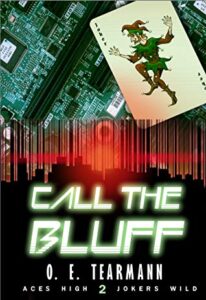 It costs a lot to win. And even more to lose.
It costs a lot to win. And even more to lose.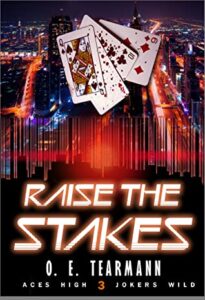 It starts when you’re always afraid.
It starts when you’re always afraid.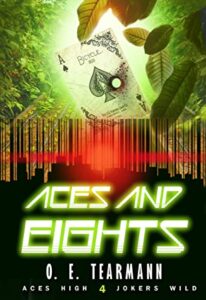 The year: 2157
The year: 2157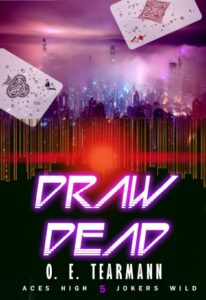 There’s a calm before the storm…
There’s a calm before the storm…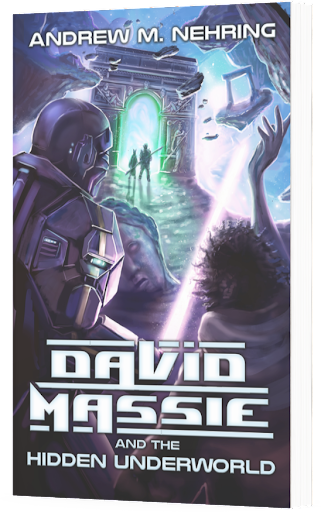 CHICAGO – Kid genius David Massie is excited for things to finally return back to normal when he gets back to middle school after saving the world and solving the mystery of the Quantum Flux. But life is far from normal in Andrew M. Nehring’s latest installment of his middle grade sci-fi series, “David Massie and the Hidden Underworld,” (Aug. 9, 2022, Books Fluent)
CHICAGO – Kid genius David Massie is excited for things to finally return back to normal when he gets back to middle school after saving the world and solving the mystery of the Quantum Flux. But life is far from normal in Andrew M. Nehring’s latest installment of his middle grade sci-fi series, “David Massie and the Hidden Underworld,” (Aug. 9, 2022, Books Fluent)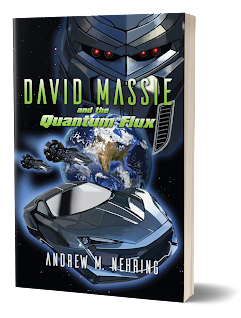 “David Massie and the Quantum Flux”
“David Massie and the Quantum Flux”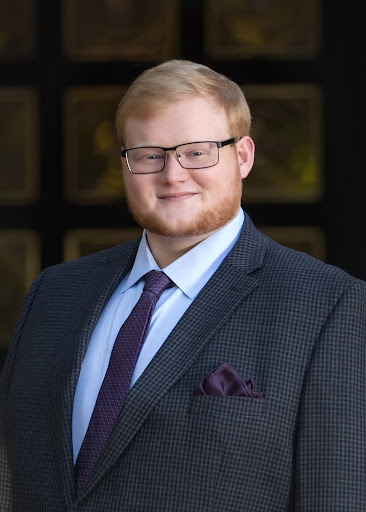 Andrew M. Nehring is the author of David Massie as well as The Corrupted Light Chronicles. Growing up, he was always a very imaginative child who would tend to get lost in these worlds he created for himself. That passion for creativity never stopped. The concept of David Massie came to him after years of being an avid fan of science-fiction. This world that he created draws from both old and new sci-fi concepts.
Andrew M. Nehring is the author of David Massie as well as The Corrupted Light Chronicles. Growing up, he was always a very imaginative child who would tend to get lost in these worlds he created for himself. That passion for creativity never stopped. The concept of David Massie came to him after years of being an avid fan of science-fiction. This world that he created draws from both old and new sci-fi concepts.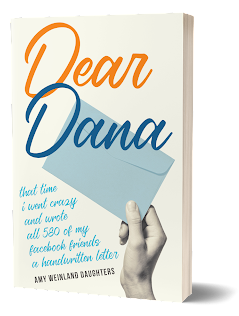 HOUSTON – When’s the last time you’ve received a handwritten letter in the mail? The validity of online connections is put to the test when author Amy Daughters just does that in “Dear Dana: That Time I Went Crazy and Wrote All 580 of my Facebook Friends a Handwritten Letter” (She Writes Press, May 17, 2022).
HOUSTON – When’s the last time you’ve received a handwritten letter in the mail? The validity of online connections is put to the test when author Amy Daughters just does that in “Dear Dana: That Time I Went Crazy and Wrote All 580 of my Facebook Friends a Handwritten Letter” (She Writes Press, May 17, 2022).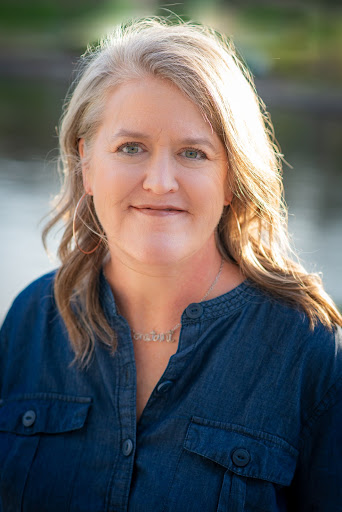 AMY DAUGHTERS has spent the past 10 years freelancing on topics from college football to emotions. She is the author of “You Cannot Mess This Up: A True Story That Never Happened” (2019), for which she received recognition at the 2019 Foreword INDIES and the 2020 Next Generation Indie Awards. When she’s not writing, Daughters can be found researching history, golfing, or ribbon dancing. She lives in Tomball, Texas with her husband Willie and two sons, Will and Matthew.
AMY DAUGHTERS has spent the past 10 years freelancing on topics from college football to emotions. She is the author of “You Cannot Mess This Up: A True Story That Never Happened” (2019), for which she received recognition at the 2019 Foreword INDIES and the 2020 Next Generation Indie Awards. When she’s not writing, Daughters can be found researching history, golfing, or ribbon dancing. She lives in Tomball, Texas with her husband Willie and two sons, Will and Matthew.
